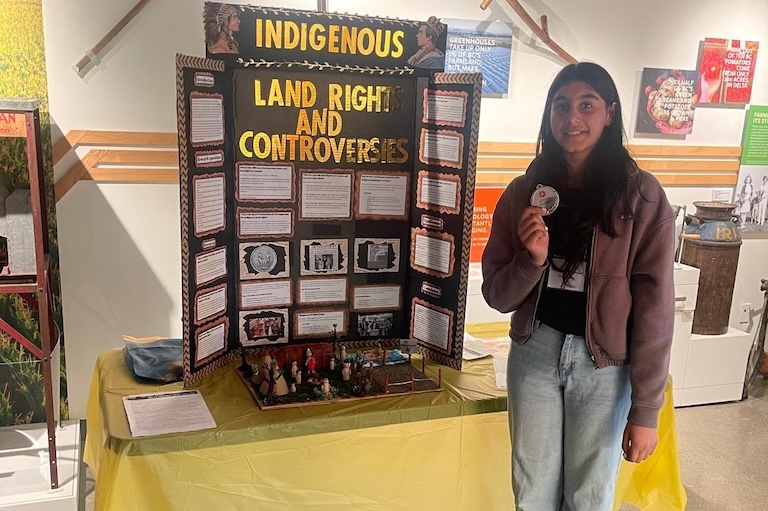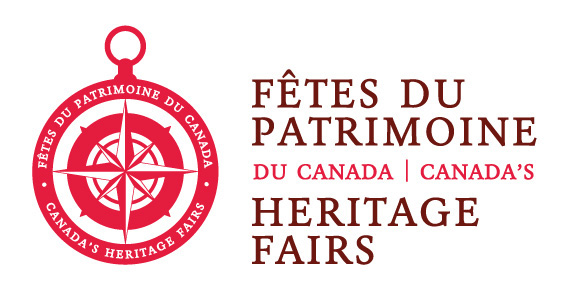Sukhreet G.

Indigenous Land Rights And Controversies
Sukhreet G.
Delta Heritage Fair
Delta, BC
My Heritage Fair project is about Indigenous land rights and the controversies surrounding them in Canada. I chose this topic because I wanted to understand why land is so important to Indigenous peoples and why land disputes still happen today. Through my research, I used a variety of sources—including government websites, news articles, academic books, and Indigenous voices from interviews and videos—to explore legal, historical, and cultural aspects of the issue.
I learned that Indigenous land rights are based on a deep connection between Indigenous communities and their traditional territories. Land is more than property; it is tied to culture, spirituality, survival, and identity. The Royal Proclamation of 1763 was an early document that recognized Indigenous land ownership, but many promises were broken as European colonization changed how land was viewed, turning it into something to be bought and sold. This caused many conflicts and led to serious land disputes, like the Oka Crisis and the Wet’suwet’en pipeline protests, where Indigenous people fought to defend their territories.
Over time, Indigenous leaders took cases to the courts. The Supreme Court of Canada made important rulings, including the Delgamuukw and Tsilhqot’in decisions, that legally recognized Indigenous land title and rights. While these are major advances, many land claims remain unsettled, and Indigenous peoples continue to face challenges.
I believe reconciliation requires more than apologies; it means respecting land rights, listening to Indigenous voices, and standing for justice. Canadians today have a role in learning the truth, honouring treaties, and supporting Indigenous communities in their ongoing fight to reclaim and protect their lands.
What sources and evidence did you consult for your project? What different perspectives did they provide on your topic?
For my project on Indigenous land rights and controversies in Canada, I used many different sources. I looked at government websites to understand laws, treaties, and policies. News articles from CBC and The Globe and Mail helped me learn about recent land disputes like the Wet’suwet’en protests and the Oka Crisis. I also read academic books and articles to get historical and legal background, including the Royal Proclamation of 1763. Importantly, I included Indigenous voices from interviews and videos to hear their experiences and views directly.
These sources showed me different perspectives. Indigenous peoples focused on their deep connection to the land and the need for respect and justice. Governments often discussed laws and agreements, while companies emphasized economic development. These differing views helped me understand why Indigenous land rights are still a controversial and important topic in Canada today.
What is the historical significance of your topic?
Indigenous land rights are historically significant because Indigenous peoples have had a deep connection to their land for thousands of years. When Europeans arrived, they introduced new ideas about land ownership and made treaties like the Royal Proclamation of 1763, but many promises were broken, leading to conflicts. Short-term impacts included forced removal from lands and protests like the Oka Crisis. Long-term effects involve ongoing legal battles and court rulings that recognize Indigenous land titles, though many claims remain unresolved. Indigenous communities were most affected, facing displacement and cultural loss, while governments and settlers often benefited. Legal changes and awareness have grown, but struggles continue.
Why did you choose this topic?
I chose the topic of Indigenous land rights because I wanted to understand why land is so important to Indigenous peoples and why land disputes continue to happen in Canada today. I realized that land is not just property to Indigenous communities—it is tied to their culture, identity, and way of life. Learning about the history of colonization, broken treaties, and ongoing struggles helped me see how these issues affect Indigenous peoples deeply. I also wanted to learn how Canadians can support reconciliation and justice by respecting Indigenous land rights. This topic felt important because it shows the connection between history, law, culture, and fairness.

